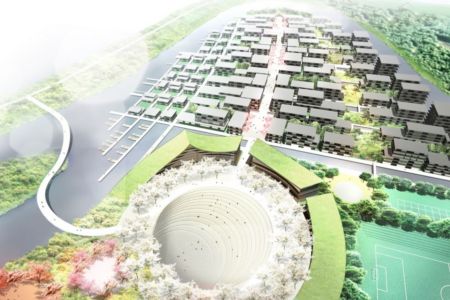Global Leadership in Real Estate and Design
In today’s connected urban centers, shifts in cultural preferences, design thinking, and spatial significations often reflect and parallel transitions in capital forces and economic realities, locally and across the globe. This course begins with the premise that globalization imposes forces and tensions that directly impact the formation and production of the urban built environment, and that future real estate and design professionals will have a competitive advantage if they are well-prepared to navigate the cultural and economic disequilibrium and disruptions of the global realm.
For these challenges, this project-based course encourages a forward-looking examination of and exposure to complexity in today’s real estate design, development and investment process, through students’ hand-on experience, creative propositions, risk-taking judgment training, and the exercise of leadership in real estate and design projects in the real world. The course integrates domestic and international field studies, and encourages students to rethink, anticipate, and reinvent practice paradigms in both real estate and design fields.
The pedagogical focuses of this course are to: 1) provide practice opportunities for students to sharpen professional skills required to traverse global contexts as culturally-sensitive and professional practitioners, and 2) to establish an intellectual framework for students to understand the interrelationship between real estate and design.
The interrelationship between real estate, design, and their underlying production process are explored through analysis of rational economic activities, real estate market performance, ownership structures, private and public joint venture, as well as the efficacy of public financing.
Projects Description
Each year, the Global Leadership in Real Estate and Design course focuses on two development/investment sites — one domestic and the other international. For Spring 2014, the two sites will be:
Downtown Boston Waterfront:
This year’s domestic project is an opportunity to rethink and redefine the relationship between downtown Boston and Boston Harbor. The project is the redevelopment of the Boston Harbor Garage—a monolithic 7 story structure of 459,000 square feet, built during the era when the waterfront was something to be avoided rather than celebrated. Acquired by the developer in 2007 for $153 million, the property currently has a net profit of $8.5 million annually. With constant interaction with the developer, architects, brokerage firms and other real estate professionals, students will address questions such as: Is it in the best interest of the city and the public to redevelop this site? If so, how it should be redeveloped?
Haizhu Lake Ecological Village, Guangzhou, China:
This site is located outside the city of Guangzhou. Known historically as Canton, Guangzhou city is located on the Pearl River Delta. It is the third largest Chinese city and the largest city in southern China. Our site is adjacent to Haizhu Lake. The development/investment program is mixed-use including a cultural destination and tourist attractions. Sponsored by the developer, students will act as consultants to provide vision and solutions for investing in and developing the site. Students will learn how to balance conservation and development, while creating proposals that simultaneously generate design and investment value.
Projects
-

The Haizhu Gardens: Guangzhou Group
Fall 2014